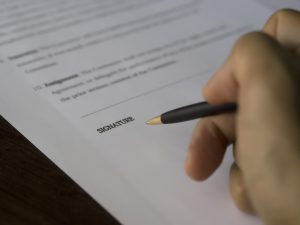Why You Should Consult an IP Attorney Before You Brand Your Business
 By “branding a business,” most people mean selecting a name for the business, a trade name, that sets the business apart and identifies the business. When used on goods or for advertising services, then a word, name, symbol or device can also develop trademark significance. In either event, the standards for infringement are the same: does your use of the trade name or trademark create a likelihood of confusion among the relevant public for your goods or services? The marks don’t have to be identical, and the similarities are typically more important than the differences.
By “branding a business,” most people mean selecting a name for the business, a trade name, that sets the business apart and identifies the business. When used on goods or for advertising services, then a word, name, symbol or device can also develop trademark significance. In either event, the standards for infringement are the same: does your use of the trade name or trademark create a likelihood of confusion among the relevant public for your goods or services? The marks don’t have to be identical, and the similarities are typically more important than the differences.
Your advertising agency may suggest a variety of potential marks or trade names from which you may select. The ad firms may have done an initial investigation to see if the mark is available, first at the U.S. Patent & Trademark Office to see whether any similar businesses have conflicting trademark registrations, and then through one or more search engines, to see how the potential mark or trade name is used, even if not registered. Although these preliminary searches can be helpful in showing whether a name or mark is not available, they are inadequate, at best, to show the name or mark is adoptable or even eligible for federal registration.
 Trademark attorneys routinely perform comprehensive searches, typically through a professional search firm, to provide a report to the firm on related U.S. federal trademark registrations, applications for registration, and common law uses, which include state registrations, the world-wide web, business names, and online databases including industry directories, catalogues, buyers’ guides, and proprietary listings of trademarks, brand names, and internet domain registrations. The attorney can prepare a legal clearance opinion based on the results of the search that can provide guidance on whether the trade name or mark is available for you to adopt and use, the risk of objections by others who might consider themselves damaged by the mark, and, in the case of trademarks, whether the term is potentially registrable. Trademark rights are territorial and so we typically search in foreign countries on an as needed basis as determined by the client.
Trademark attorneys routinely perform comprehensive searches, typically through a professional search firm, to provide a report to the firm on related U.S. federal trademark registrations, applications for registration, and common law uses, which include state registrations, the world-wide web, business names, and online databases including industry directories, catalogues, buyers’ guides, and proprietary listings of trademarks, brand names, and internet domain registrations. The attorney can prepare a legal clearance opinion based on the results of the search that can provide guidance on whether the trade name or mark is available for you to adopt and use, the risk of objections by others who might consider themselves damaged by the mark, and, in the case of trademarks, whether the term is potentially registrable. Trademark rights are territorial and so we typically search in foreign countries on an as needed basis as determined by the client.
When your chosen brand is considered available under the relevant legal standards, you can go forward in greater confidence that you will less likely suffer challenges to your brand in the future. Challenges can range from the cost of changing all your advertising materials and the attendant loss of trade recognition to money damages for infringement coupled with loss of previously established trade recognition.
 Interested in speaking with an IP Attorney? Contact Pedigo Law. We would be happy to counsel you.
Interested in speaking with an IP Attorney? Contact Pedigo Law. We would be happy to counsel you.
THE INFORMATION YOU OBTAIN AT THIS SITE IS NOT, NOR IS IT INTENDED TO BE, LEGAL ADVICE. YOU SHOULD CONSULT AN ATTORNEY FOR ADVICE REGARDING YOUR INDIVIDUAL SITUATION. WE INVITE YOU TO CONTACT US AND WELCOME YOUR CALLS, LETTERS, AND EMAIL. CONTACTING THE FIRM DOES NOT CREATE AN ATTORNEY-CLIENT RELATIONSHIP. PLEASE DO NOT SEND ANY CONFIDENTIAL INFORMATION TO THE FIRM UNTIL SUCH TIME AS AN ATTORNEY-CLIENT RELATIONSHIP HAS BEEN ESTABLISHED. MANY INVENTIONS ARE NOT PATENTABLE AND MANY PATENTED INVENTIONS ARE NOT SUCCESSFUL IN GENERATING SALES. SALES OF PATENTED PRODUCTS MAY BE DUE TO A VARIETY OF FACTORS AND SUCCESS FOR ONE PATENT OR LICENSE AGREEMENT SHOULD NOT BE CONSIDERED REPRESENTATIVE OR TYPICAL OF RESULTS YOU MIGHT EXPECT BASED ON A PATENT OBTAINED OR LICENSE WRITTEN BY THIS FIRM. EXAMPLE(S) WILL ONLY BE PROVIDED TO DEMONSTRATE WORK PRODUCT AND WITH THE CLIENT’S PERMISSION.






RECENT COMMENTS